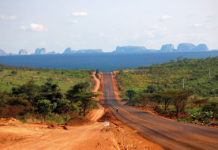The DRC is undergoing a serious political and institutional crisis, which has major repercussions on the economic activity of the whole country with a marked deterioration in the living conditions of its populations.
New movements of armed resistance, particularly in Kasai, undermine the authority of Kinshasa, fuel a spiral of violence and worry neighboring countries.
In particular, Angola, already weakened by the decline in its oil revenues, fears contagion on its territory of the violence observed in the Kasai, with the inevitable induced population displacements.
On the economic front, the Congolese franc lost nearly 40% of its value against the dollar in a few months, threats to fuel supplies and foreign exchange reserves reached a worrying level.
Lack of insight into the political and security situation in the country is a source of concern for potential new investors and is hampering the activities of existing operators. This slowdown in economic activity mechanically reduces government revenues and its ability to balance its budget, a significant part of which concerns the financing of the electoral process postponed at the end of this year.
The 2017 Finance Bill provides for a significant increase in the state budget compared to 2016, while all indicators confirm a general decline in economic activity. It favors increasing the fiscal and parafiscal pressure on formal sector enterprises, instead of a voluntarist and ambitious policy of broadening the tax base for operators in the informal economy, which does not contribute to the the State.
This informal activity is largely fueled by contraband products from cross-border trade. While this situation temporarily pacifies certain social tensions by enabling people to access essential necessities at low cost, it is to the detriment of many jobs lost in the DRC in the sectors thus subjected to such unfair competition.
Moreover, texts such as the Agricultural Law promulgated in 2011 and more recently the Law on Subcontracting considerably restrict the scope of action of foreign companies in the DRC by discriminatory measures. This is a strategic mistake.
Faced with this very bleak assessment, the priority of the DRC is to emerge from the social and political crisis in which it inexorably sinks.
From an economic point of view, promoting entrepreneurship for small and medium-sized enterprises, as a means of creating value and growth, will require training, education, exemplarity, access to capital, exchanges with Partners, and governance. It can not be built sustainably on isolationism, protectionism and withdrawal.
A major project is being set up by the Government to revise taxation in the DRC. Perhaps a ray of hope in this difficult context. Let us hope that it isn’t, once again, an illusion.
![[:en]shutterstock_754857016[:]](https://perspectives-cblacp.eu/wp-content/uploads/2017/07/shutterstock_754857016-696x522.jpg)


